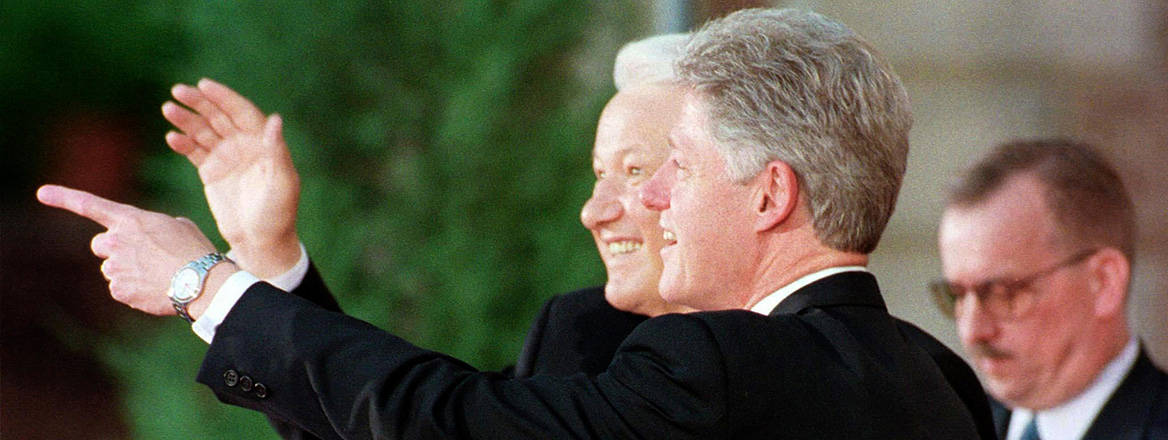Andris Banka

Is the NATO-Russia Founding Act still alive today? Addressing the Lennart Meri Conference in May 2022, the Estonian Ambassador to NATO remarked that there was no alliance-wide consensus on what to do with this historical document, first adopted in 1997. ‘Some are saying it is like the Schrödinger’s cat, you don’t know whether it is dead or alive’, he jokingly added. NATO’s landmark summit in Madrid provided an opportune moment to clarify the status of this agreement and hammer out a common NATO line.
A quarter of a century has passed since NATO, in the name of building more cordial and predictable working relations with Moscow, committed itself to a set of military constraints. The NATO-Russia Founding Act, which is not a formal treaty but rather a politically based pledge, stipulated that in ‘the current and foreseeable security environment’ no permanent bases or nuclear weapons would appear on the territory of new alliance member states. Needless to say, the West and Russia – mostly as a result of Moscow’s actions – have today significantly veered off the path of cooperation.
In the wake of Russia’s Crimea land grab in 2014 and its subsequent 2022 full-scale war in Ukraine, numerous policy analysts and government officials have repeatedly pronounced the death of this founding document, only for it later to be resurrected by other allied partners. The most vocal critics, Poland and the Baltic states, have long viewed the Founding Act as a cardinal error. For them, it represents an ill-advised self-restraint from a bygone era, and the alliance would be better served if it unchained itself from the agreement. ‘I believe that NATO should state it loud and clear: the act no longer exists’, the Polish president was quoted as saying a month into Russia’s brutal atrocities in Ukraine.
The Founding Act has also taken a serious battering from Baltic lawmakers. ‘I don’t care if they should put it in a mausoleum or bury it in a grave’, Latvia’s long-serving foreign minister recently fumed. His Baltic counterparts equally joined the chorus, and have pressed for an official scraping of the NATO-Russia framework agreement. The always plain-speaking former Estonian President Toomas Hendrik Ilves insisted upon its instant annulation. ‘The Russians are engaged in a genocidal massacre, while we’re sticking to the founding act’, he summarised succinctly.
Even those who were once personally involved in crafting this agreement now assert that its time has run out. In a recent op-ed, three prominent former US diplomats proclaimed that while the Founding Act did manage to deliver some tangible results in the early days, Vladimir Putin’s war in Ukraine has simply made the NATO-Russia agreement obsolete.
Yet not everyone has rushed to declare the document null and void. Rankling Eastern Europeans, the French and German leadership in particular have been reluctant to formally axe it. Already in 2016, then-German Defence Minister Ursula von der Leyen, while acknowledging that Russia had unilaterally breached the act by seizing Crimea, nevertheless objected to its official repeal. In June 2022, German Chancellor Olaf Scholz similarly took a stand against its shredding on the grounds that this would only ‘play into the hands of Putin and his propaganda’. This policy stance was subsequently reiterated by Germany’s Foreign Minister Annalena Baerbock.
During the latest NATO gathering, certain alliance members clearly sought to salvage the Founding Act on paper, and as such disappointed those who had called for a formal abrogation. In an odd way, what this means is that the NATO-Russia Founding Act remains both alive and dead at the same time. As Russia’s Foreign Minister Sergey Lavrov affirmed right after the summit, ‘the act remains in force as neither side has backed out so far’. The same was stipulated by Scholz, who in a rather innovative twist proclaimed that the act still exists precisely to remind everyone of what Russia once committed itself to and how it has now egregiously violated it.
At the end of the day, however, what matters more is not whether the act technically speaking remains in the books, but whether NATO governments feel constrained by it when it comes to designing military plans. Already during the run-up to the alliance leaders’ gathering in Spain, leading NATO and US officials asserted that the Founding Act will not be considered a barrier when it comes to implementing new force deployments on the alliance’s eastern flank. The net result from the NATO 2022 summit, most notably the thickening of enhanced rotational deployments in the Baltics as well as the setting up of a new permanent army headquarters in Poland, speaks to the fact that in practical terms the NATO-Russia Founding Act is a dead letter. As it should be.
No comments:
Post a Comment